| Adolf Hitler | |
|---|---|
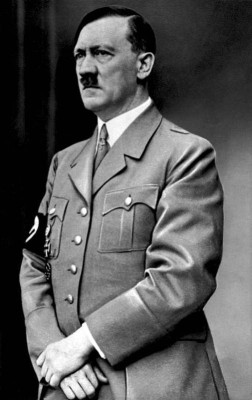 |
|
| Photo by: DIREKTOR Creative Commons | |
| Leader of Nazi Germany | |
| In Power | 1934-1945 |
| Born | 1889 Braunau am Inn, Austria-Hungary |
| Died | 1945 Berlin, Germany |
| Nationality | German |
Hitler (1889-1945) was a very prominent and infamous German politician. He eventually became the leader of the Nazi Party and became the catalyst of establishing Germany as a Nazi nation. He became the chancellor of Germany in 1933, turning it into what was Nazi Germany in 1934. He led until 1945.
Hitler’s Early Life
Adolf Hitler’s birthplace was Braunau am Inn, Austria on April 20, 1889. Alois Schickelgruber Hitler and Klara Poelzl were the parents of Adolf Hitler. As a kid, Hitler was described as being lazy, as well as moody and even resentful. His father was very strict and authoritative and it is said that Hitler was hostile toward him. However, Adolf was very attached to his mother, who was a hard worker and was described as being indulgent. When Hitler was an adolescent, his mother passed away due to cancer. This loss was incredibly hard for him to take.
As Hitler grew a little bit older he attended Realschule in Linz, but only spent four years there. He wanted to become a painter, and this was actually one of his biggest dreams. Hitler decided that it would be best to leave school at the age of 16 in order to pursue his dream. He eventually made his way to Vienna after he left his home in October of 1907. He spent about five or six years in Vienna.
While in Vienna Hitler worked odd jobs in order to support himself and sold sketches in taverns. Hitler found himself staying in hostels and spending quite a bit of time in cafes. He would talk with people about how he hoped for a better Germany.
It was in Vienna where Hitler studied demagogic techniques that were performed by Karl Lueger, the popular mayor of Vienna at the time. This was also where Hitler started to learn more about politics. During this time, Hitler also learned about anti-Semitism and became greatly concerned with the purity of blood. Eventually, while still in Vienna, he started to believe that the Jews were the cause of the chaos of their time as well as being responsible for all of the economic mishaps that their society endured. Hitler also believed that the Jews were responsible for corruption in politics as well as culture in general.
Hitler and World War I
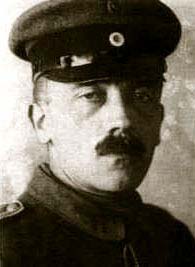 Once Hitler finally left Vienna, he decided that he would go to Munich in May, 1913. However, war broke out in 1914, and it was then that he made the decision to join the military. While in the military Hitler was awarded the Iron Cross, which was given to him as a reward for his bravery. Even though he demonstrated that he was a great soldier, he did not advance higher than a Lance Corporal. While in the military he was wounded two times and he had to go to a Pomeranian hospital for three months to heal. Hitler was enraged by the defeat of the German military. After recovering, he came to believe that he was chosen to the rescue of a nation that was left humiliated by the war. He thought that he was destined to save the nation from the Jews as well as the Treaty of Versailles.
Once Hitler finally left Vienna, he decided that he would go to Munich in May, 1913. However, war broke out in 1914, and it was then that he made the decision to join the military. While in the military Hitler was awarded the Iron Cross, which was given to him as a reward for his bravery. Even though he demonstrated that he was a great soldier, he did not advance higher than a Lance Corporal. While in the military he was wounded two times and he had to go to a Pomeranian hospital for three months to heal. Hitler was enraged by the defeat of the German military. After recovering, he came to believe that he was chosen to the rescue of a nation that was left humiliated by the war. He thought that he was destined to save the nation from the Jews as well as the Treaty of Versailles.
In the summer of 1919, Hitler was given educational duties by the Reichswehr military organization. His duties had him spying on political parties. He also investigated the party known as the German Workers’ Party, which was a group of idealists. In the fall of the same year he joined the small party. The name was eventually changed to the NSDAP, which is short for the National Socialist German Workers’ Party. After two years he became the group’s chairman.
Hitler Becomes a Leader
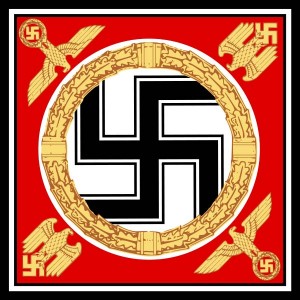 When Hitler became the leader of the party, he decided that it needed a new symbol, and that is how the infamous Swastika was born. The term “Heil,” which was a greeting, was also created at this time. Hitler started to enjoy being a leader and people started to pay attention to his speeches. Eventually, Hitler attracted more people to the group. By 1921 he was the leader of a party that had around 3,000 members. At this point, he realized that he possessed a fair amount of power and started to keep his meetings calm by having strong-arm squads monitor the meetings. He also used the squads to break up meetings that were held by his opponents. The SA, short for storm troopers, were eventually created and the SS, short for Schutzstaffel, became the bodyguards for Hitler.
When Hitler became the leader of the party, he decided that it needed a new symbol, and that is how the infamous Swastika was born. The term “Heil,” which was a greeting, was also created at this time. Hitler started to enjoy being a leader and people started to pay attention to his speeches. Eventually, Hitler attracted more people to the group. By 1921 he was the leader of a party that had around 3,000 members. At this point, he realized that he possessed a fair amount of power and started to keep his meetings calm by having strong-arm squads monitor the meetings. He also used the squads to break up meetings that were held by his opponents. The SA, short for storm troopers, were eventually created and the SS, short for Schutzstaffel, became the bodyguards for Hitler.
Hitler eventually turned his focus to the Jews, who he considered to be the number one internal enemy. He also started to focus on the Versailles Treaty and the Marxists. In 1920, Hitler flexed his power by announcing that German Jews were not welcomed in the community. The leader of the party had many goals, but the main goal of Hitler was to remove the Jews.
In 1923, Hitler decided that it was time to try to get rid of the Bavarian government located in Munich. He convinced local nationalist groups to help him overthrow the government. Hitler headed into Munich and entered a beer hall with his pistol which he fired off. It was there that he announced a new provisional government, which he was the head of. Hitler said that he and his new government were going to lead a revolution against Red Berlin. Hitler brought 3,000 men through Munich, but police came and a gunfight took place. Hitler was not win that battle and was arrested. In February of 1924, Hitler was tried in court. He gave a speech which turned the tables on the people who were accusing him of committing crimes. He was still found guilty, but was only sentenced to jail for five years. Instead of spending the entire five years behind bars, he spent only nine months. While in jail, he and a follower wrote Mein Kampf, which quickly became what was considered the “bible” of Hitler’s party. The book ended up being a major success, selling millions of copies by 1939.
While Hitler was in jail some of his followers ended up leaving the group, but he started to rebuild the movement again. Hitler learned from the beer hall incident and decided that the best way to gain power was not through force, but by using the Weimar Constitution to his advantage. However, he still used intimidation and street terror tactics to start gaining power again.
The Nazi Party Rises
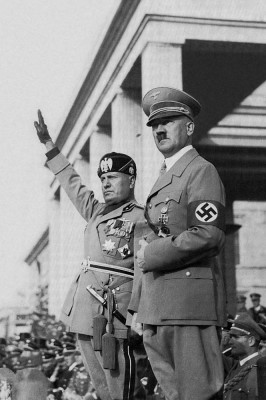 By 1925 the Nazi Party ban was finally removed and Hitler was then allowed to speak in public, with permission. Once 1926 came, he started to re-brand himself as someone that all factions could look up to. People from the Right and Left were attracted to his movement. It did not take long for him to appeal to people from all over the country.
By 1925 the Nazi Party ban was finally removed and Hitler was then allowed to speak in public, with permission. Once 1926 came, he started to re-brand himself as someone that all factions could look up to. People from the Right and Left were attracted to his movement. It did not take long for him to appeal to people from all over the country.
There were a lot of people in Germany who felt that the economy was in very bad shape. This lead many middle class people to be attracted to Hitler’s party. In 1928 twelve seats were won by the Nazi party. In 1929, the Nazi Party became even more powerful when military members, nationalist conservatives and big corporations started to support him. Hitler started to gain some major exposure after he received help from Alfred Hugenberg, who was a major force in the press industry. Hugenberg helped Hitler gained a great deal of exposure, not only on the local level but on a national level. All of the exposure helped Hitler come across as someone who wanted to make Germany a much better place to live.
Once 1930 came around, his party’s vote skyrocketed to 6,409,000 from 810,000. Instead of getting just twelve seats, this time around they managed to get 107 seats in Reichstag. Hitler became a German citizen and he ran for president shortly after that. Hitler gained more power on January 30, 1933, as von Hindenburg nominated Hitler to become the Chancellor.
Once Hitler became the Chancellor he started to crackdown on conservatives by not allowing them to participate in anything government related. He also started to get rid of free trade unions and communists. Social Democrats as well as Jews were not allowed to take part in anything related to politics and he created concentration camps where he sent his opponents. Eventually, the Nazi Party’s use of intimidation started to become legal, due to Hitler enacting special laws.
Hitler Becomes a Dictator
Hitler finally became the dictator of the Third Reich when the Fuhrer and Chancellor positions were united into one. This meant that Hitler had all of the power. The Versailles Treaty was then abandoned by 1935, and this was when the army was built up considerably.
The Munich Agreement was signed in 1938 in which the British, French and Italians agreed to annex Czechoslovakian areas bordering Germany. Hitler started to expand his territories. The leader than set his focus on Poland, as he wanted the country to become independent. He wanted to avoid getting into a major war right away, so he decided sign a pact with Russia, which was a symbol of friendship.
World War II
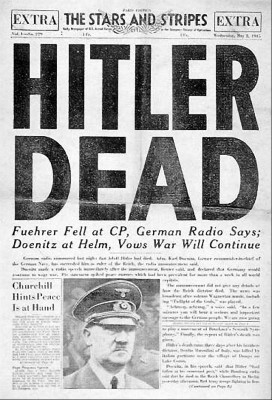 On September 1st, 1939, Hitler and his army invaded Poland, marking the beginning of World War II, and his intentions became clear to the world. He wanted to make sure that Germany’s territory was secured and that he could then dominate and rule over all of Europe.
On September 1st, 1939, Hitler and his army invaded Poland, marking the beginning of World War II, and his intentions became clear to the world. He wanted to make sure that Germany’s territory was secured and that he could then dominate and rule over all of Europe.
Germany ended up winning many major battles. In a span of six weeks Hitler took over Poland, Norway and Denmark. By 1940 France, Belgium and Luxemburg were seized by Hitler and his army. The only country in Europe to stand firm was England.
Hitler suffered a setback and could not take over the English Channel because England’s air force fought back. Hitler decided that it was not in his best interest to invade the British Isles. Instead, he decided to go to North Africa and the Balkans, but his allies were defeated there. However, in other parts of Europe, such as Greece and the Island of Crete, he easily gained control.
The war went on for many years, but one of the major turning points of the war was when America got involved. The United States, England and Russia formed an alliance. Hitler started to lose battles in Russia due to the extreme winter weather conditions.
Hitler started to suffer from major health problems and could not make as many public appearances. Many saw the war coming to an end due to visible signs that Germany was heading for defeat.
The United States and its allies eventually launched major assaults on Germany and eventually Hitler’s regime fell. Hitler saw that there was no place to run and he decided to commit suicide. The war continued on and eventually came to an end after the United States dropped atomic bombs on Hiroshima and Nagasaki, Japan in 1945. When the war ended, it marked the end of Hitler’s reign over the country and much of Europe.